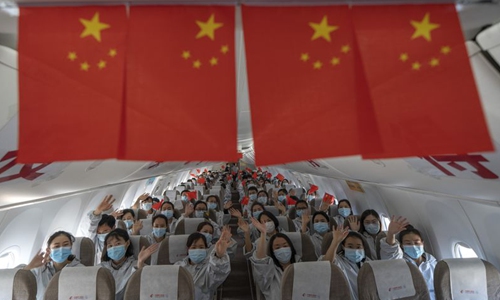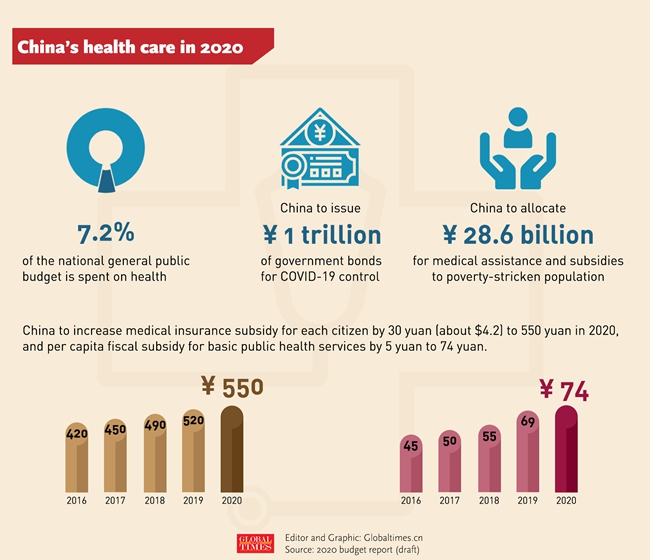
Photo:Xinhua
The government work report delivered by Premier Li Keqiang at the third session of the 13th National People's Congress (NPC) on Friday clearly charted the future efforts in the public health sector, especially those found inadequate from China's COVID-19 response at the early stage, which showed the central government's determination to never allow a resurgence of the epidemic or any other infectious disease, Chinese medical experts said on Friday.
China has made major strategic achievements in response to COVID-19, but several loopholes have been exposed in the public health emergency management during COVID-19 prevention and control, Li said.
Li said China is committed to reforming the disease prevention and control system, improving infectious disease direct reporting and warning system, and timely and transparently releasing epidemic-related information.
China will issue one trillion yuan ($141 billion) of government bonds to battle the coronavirus, which will be used to increase investment in vaccine research and fast testing technology development, expand medical facilities for epidemic prevention and treatment, increase mobile laboratories, intensify support for emergency supplies, and strengthen community-level health and epidemic prevention efforts, Li said.
China will accelerate the establishment of national laboratories and reorganize other key laboratories, he said.

Infographic: GT
China will allocate 605 billion yuan ($85 billion) in the next six months for special transfer payments used mainly to ensure the basic livelihood of the people, build the public health and emergency supplies support system and cope with uncertainty, according to a draft budget to be submitted to the third session of the 13th NPC.
The coronavirus sovereign debt and special transfer payment, which was first mentioned in this year's budget, shows the central government attaches increasing importance to the public health sector, medical experts said.
Previously, the budget for the public health was listed together with education, social insurance, agriculture and environment in 2019's draft, while in 2018, it only mentioned subsidy funds for public health services and medical rescue for areas of extreme poverty.
Wang Guangfa, a leading Chinese respiratory expert at Peking University First Hospital in Beijing, who was dispatched to Wuhan in early January, told the Global Times on Friday that China could get 90 out of 100 points for COVID-19 response this year, and the missing 10 points were due to the weakness in the mechanism mentioned in the work report.
Wang said that when improving the infectious disease direct reporting system, we have to ensure that the reporting channel is unimpeded, and governments at all levels should leave the scientific assessment of epidemic to professionals rather than intervening in it.
Investment in vaccine research and fast testing development was significant. China still lags behind the US in overall technology, as the earliest fast diagnosis reagents were first developed by the US, Wang said.
Hospitals should invest in public health sectors, such as storing enough protective gear. Therefore, it's necessary for the government to increase investment in hospitals.
The biggest loophole in China's disease prevention and warning mechanism is that some local governments neglected the reporting and warning protocol for virus outbreaks, fearing that the outbreak may affect their performance, Zeng Guang, chief epidemiologist at the Chinese Center for Disease Control and Prevention, told the Global Times on Friday.
To plug this loophole, Zeng believes local governments should strictly abide by the country's laws and regulations.
Wang Peiyu, a deputy head of Peking University's School of Public Health, said that grassroots disease control departments had to undergo layers of bureaucratic procedures to report any suspicious signs of contagious diseases, which is time-consuming, and the reporting chain may be cut off at any level.
Wang suggested breaking the barrier between disease control departments, hospitals and all-level governments to allow medical institutes to report contagious diseases directly to the government.
"After SARS, the government had been devoted to fixing safety lapses of the then public health system, but the efforts were gradually neglected after the crisis faded in people's memory," said Wang, believing that the government has now demonstrated a strong determination to plug loopholes in public health.
Wang is confident that, this time, the lessons of building up effective public health system will stick, and the country won't allow a recurrence of any large-scale epidemic.
The government work report has echoed many proposals and suggestions from political advisors and legislators, who provided detailed measures.
Some proposed the establishment of a mechanism for direct communication between the central and local governments over major public health emergencies and to improve the infectious disease reporting system. Others also suggested that the National Health Commission come up with a detailed warning system of infectious diseases and classification standards of warnings on different levels, and then include them in China's infectious diseases prevention law.
At an NPC's press conference on Thursday night, Zhang Yesui, the spokesman for the third session of the 13th NPC, said that China will introduce and revise 30 laws related to public health, infectious diseases and emergency responses in two years.


